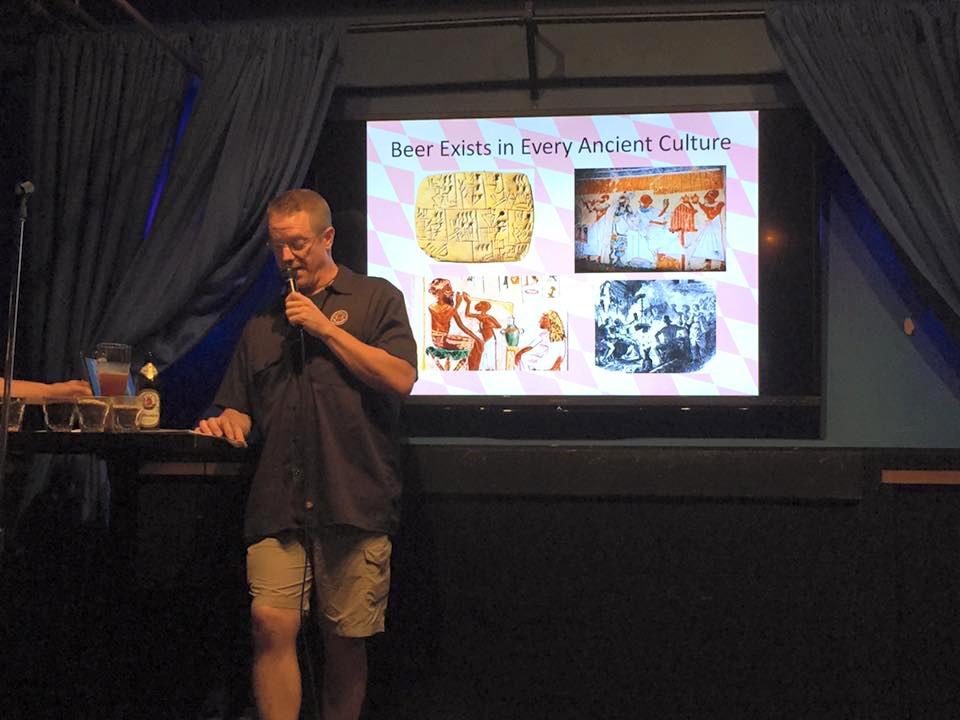Science on Tap series focuses on casual academic discussion

GVL / Courtesy – Science on Tap Grand Rapids David Ringler presents on Thursday, August 13, 2015 as part of the Science on Tap Grand Rapids event.
Sep 15, 2016
Put together beer and science and what do you get? Either a hangover or a newfound interest in primate sex.
Cynthia Thompson, an assistant professor in the biomedical sciences (BMS) department at Grand Valley State University, led a presentation entitled “Monkey Sex: Who’s Doing It and Why” Thursday, Sept. 8 as part of the GVSU-sponsored “Science on Tap” series.
“The laid back and casual atmosphere is part of the community-based initiative to where you (make it) fun for people,” Thompson said. “Other than seeming like work or the arduous task of going to class, then more people are likely to partake and enjoy.”
Opened to the greater Grand Rapids community, the Science on Tap series is on the second Thursday of every month at 8 p.m. at the SpeakEZ Lounge in downtown Grand Rapids.
A knowledgeable expert hosts a discussion about current scientific topic – such as Ebola virology, the measuring of humor, mating habits in the animal kingdom or how to make beer – in order to create an informal setting for individuals to indulge their academic interests.
“It was sort of like teaching an undergraduate class except maybe a little bit funnier in terms of sneaking in a bit more jokes,” Thompson said. “It was basically about not hardcore research, but about basic understandings of how things happen in the wild and how they operate while people drink around you.”
Laura Stroik, an assistant professor in the BMS department at GVSU and the co-organizer of the Science on Tap series, said having a mixture of the Western Michigan community attend the series reinforces the goal of bringing science to a more approachable forum.
Primarily, she said, the BMS department wants to create a forum where different types of research or theories can be discussed by anyone who wants to share their ideas.
“Science here doesn’t necessarily mean hard science,” Stroik said. “It really is science in a looser science in terms of the topics that we discuss.”
Melissa Tallman, an assistant professor in the BMS department at GVSU and the other co-organizer of Science on Tap, said the next event in the series is “Empathy: What is it Good For?”
Hosted by Heather Tafel, an associate professor of political science at GVSU, the Oct. 13 event is a way to discuss the disintegration of empathy, how it has contributed to political problems in many countries and to note if the U.S. is immune to such problems. The discussion will be held at 8 p.m. in the SpeakEZ Lounge.
The event, she also said, is the way to showcase how hard political and social scientists work in collecting data and doing hard analyses.
“It seemed topical to have something more like a political science person talk since the elections are coming up,” Tallman said. “It’s not going to be a partisan talk, it’s really more of the process and the way people think and the way they vote.”
As the series continues throughout the academic year, the series lecturers will aim to contribute to a more informed community within Grand Rapids.
“The kind of variety that Science on Tap’s had is one of its strong suits because it’s not like you’re walking into a lecture hall or seeing a professor on a Grand Valley campus to talk,” Stroik said. “It is starting to become a community event.”
For more information about “Science on Tap,” visit www.gvsu.edu/bms/science-on-tap-205.htm.























